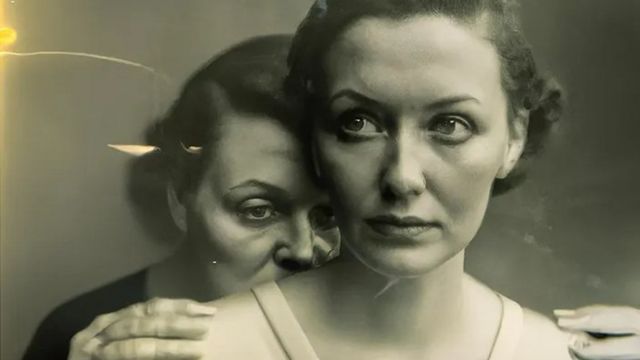- Paul Glenn
- Entertainment reporter

Image copyright Boris Eldozen
Can you tell this isn’t a real photo?
A photographer who has won one of the most important international photography awards has sparked controversy by refusing to accept his award, claiming that his image was actually produced by artificial intelligence.
German artist Boris Eldakson’s film “Pseudomania: The Electrician” won the Sony World Photo Contest in the open creativity category last week.
He said he used the photo to test competition, which created a debate about the future of photography.
Competition organizers told BBC News that Eldagin had misled them about the extent of AI’s role in making the film.
In a statement on his website, Eltaxin admitted that what he had done was just a prank, and thanked the judges for “selecting my photo and turning this into a historic moment”. It was produced by artificial intelligence.”
“Images produced by artificial intelligence should not compete with photographs for such an award,” he continued.
“Those are two different categories. AI photography is not. So, I will not accept the award.”
The winning photo is a black and white portrait of two women from two different generations.
But as Eldağzin points out, “Something doesn’t look natural about this photo, doesn’t it?” Of course, this is not a real photo, but an artificially produced photo.
The use of AI for everything from writing essays to driverless cars to chatbots acting as therapists to developing the pharmaceutical industry has generated widespread debate in recent months. Attention is now focused on the relevance and potential of using images in photography, particularly the technology known as depth forgery.
A spokesperson for the World Photography Organization, which is responsible for the photography of the Krio group to organize art events, assured the photographer that the photo was a “co-production” when he spoke with the artist before announcing his win. Artificial intelligence.
He noted that Eldagzin spoke about his interest in the “creative possibilities of artificial intelligence,” but at the same time emphasized that the photo was “based on his photographic experience.”
The spokesperson added, “The innovation category of the open competition welcomes many experimental approaches to image creation from cyanotypes. [طريقة تصوير تعتمد على استخدام مواد كيميائية حساسة للضوء]For photography, practices using the latest digital technology.
Image copyright Boris Eldozen
Boris Eldaksin says he used the photo to create “an open discussion”.
On this basis, after correspondence between us and Boris [إلدغازين] The assurances he gave, we felt his film met the conditions and standards of this category and we supported his participation.
“Furthermore, we look forward to a more in-depth discussion on this matter, and we welcome Boris’ willingness to engage in the conversation by preparing questions for an upcoming question-and-answer session with his website.”
Further, “As he has decided to decline the award, we have temporarily suspended our activities with him and have excluded him from the competition at his request.”
“They recognize the importance of this issue,” the spokesperson said [الذكاء الاصطناعي] and its impact on the photography industry today,” but emphasized that the awards “will always be a platform to support the best and talents of photography and artists working in the industry”.
Eldagin told the BBC that he had made it clear to the organizers that he wanted to engage in an “open discussion” on the matter early in the competition, but to no avail.
He also suggested that the prize be awarded to a photography festival in Odessa, Ukraine.
Analysis by Chris Vallance, BBC’s Chief Technology Correspondent
Last September, a film produced by artificial intelligence won a US state art competition, sparking a controversy to this day.
All the while, the power of technology is getting stronger by the week.
Photographers and artists who console themselves by pointing out flaws in an AI-produced image — for example, drawing hands is a problem for AI — are now harder and harder to spot.
Last month, Tim Flack, president of the National Photographers Association, told me he was shocked at how easily an AI could create an image of a tiger, almost as if he had to step inside the tiger’s cage.
A photography student who spoke to me then was worried about whether his planned life would still exist a few years from now.
Many artists and photographers accuse artificial intelligence systems of exploiting the work of the hundreds of thousands of artists they have trained, which they see as unfair to these artists — and some have filed lawsuits over it.
But others see AI as just another tool or valuable as a new branch of art.
They point out that photography was a new invention that once threatened other crafts and arts.
But there are several fundamental issues, including who should own the intellectual property rights for AI images.
Artificial intelligence has raised many ethical and legal questions that are still unanswered.
‘ I don’t blame Boris‘
Photographer and blogger Feroz Khan is particularly interested in the events of the past week. He said he did not blame the artist as he made it clear that “there is a problem here in the photography industry”.
“Initially, most people find it very difficult to distinguish between AI images and photographs (at least at first glance),” he wrote. carried out.
For this reason, Boris said organizers of photo contests should assign separate categories to AI images.
“I admire him because he wants to make a difference [بين الصور الفوتوغرافية وصور الذكاء الاصطناعي] in competitions. It is true that he entered the competition in the AI film, but I don’t know that he intended to cheat anyone. He wanted to highlight an issue that needed more attention from everyone.”
Khan concluded that Eldajin “clearly demonstrates that even seasoned photographers and art enthusiasts can be fooled.”

“Coffee evangelist. Alcohol fanatic. Hardcore creator. Infuriatingly humble zombie ninja. Writer. Introvert. Music fanatic.”
